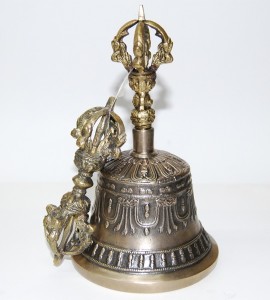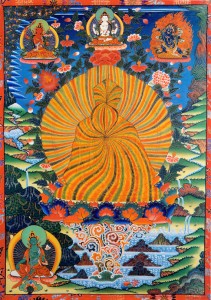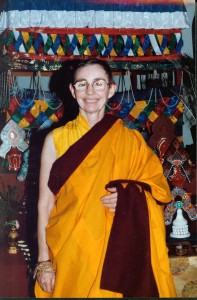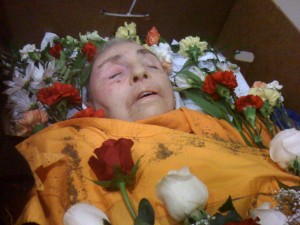
By Rinchen Khandro
In Vajrayana Buddhism there are ritual implements and instruments. Many of the Buddha images hold one or two, or many of these, depending on how many arms the particular Buddha is displaying. All of these implements have meaning. Each is there to engage our busy minds in a way that will lead us toward the Truth. Those held in the left hand relate to wisdom, the realization of the emptiness of all phenomena, and those held in the right hand relate to skillful means, or compassion.
The bell and dorje are two of these implements. The dorje, held in the right hand, represents skillful means, and the bell, held in the left, represents wisdom. Together these ritual implements represent the inseparability of wisdom and compassion in the enlightened mindstream. Looked at separately, each is a great treasure of spiritual meaning.
The word Dorje means Lord of Stones in Tibetan. It symbolizes the capacity to transform all experience into an experience of enlightened perspective. Everything in samsara, cyclic existence, is impermanent, and therefore, not to be relied upon. The dorje symbolizes the skillful means of transforming our ordinary experience to one that will propel us on our spiritual path. The dorje has five extraordinary characteristics. It is impenetrable, immovable, immutable, indivisible, and indestructible. The dorje is the indestructible weapon of the wrathful deities. It is the symbol of spiritual authority of the peaceful deities.
Vajra, the Sanskrit word, means the hard or mighty one, diamond-like. Its brilliance illuminates ignorance and reveals Truth, destroying the delusion that causes suffering. Once the cause of suffering is revealed to us, we are empowered to create the causes of happiness. Ultimately we will attain the egoless state, which is free from all suffering. From the Vajrayana perspective, the motivation for attaining this state is to relieve all beings from their suffering.
The physical appearance of the dorje is rich in meaning. At the very center is a sphere representing the dharmata, the sphere of reality itself, the ultimate truth. Surrounding the sphere on either side are one or three ‘strands of pearls’, depending on the size of the dorje. These represent the three doors of liberation. The first door is the transcendental concentration of signlessness, in which words and concepts fall away and there is nothing to grasp. The second is the transcendental concentration on directionlessness, the state of perfect equanimity–spiritual stability and balance. The third is the transcendental concentration on emptiness.
Next to the pearls on either side of the sphere are eight-petaled lotuses. The petals on one side represent the eight great Bodhisattvas; the petals on the other represent their consorts. * The next display on the vajra is a moon disc. This is the seat of the Bodhisattvas symbolizing the full realization of Bodhicitta, the Great Compassion.
There are six more rings after the moon disc. These symbolize the six perfections: generosity, moral conduct, patience, joyful effort, concentration, and wisdom. The accomplishment of these six is the foundation of the Mahayana, the Great Vehicle of Buddhist study and practice. They are the hallmark of the Bodhisattva path. When one has accomplished these, one can truly be of benefit to others.
The next thing we see on the dorje are the makaras. A makara is a composite animal with jaws like a crocodile which symbolizes effort and persistence in Dharma practice.
A vajra may have one, two, three, four, five, six, or nine prongs. The most common is the five-pronged vajra. They look like points that protrude from the curved ends, one on each curve and one at each end. These five prongs symbolize the five Buddhas of the five Buddha families and their consorts.
The bell, also, is rich in symbolic meaning and power. Mainly the bell is the mandala of Prajnaparamita, the Great Mother, she from whom all reality comes forth. By its sound, the bell invites or attracts the deities to attend or participate and warns or drives away obstructing forces. The ringing of the bell can remind one of the emptiness of phenomena or bring the mind into greater awareness. As a musical instrument, its sound can be an offering to the Buddhas and Bodhisattvas.
The hollow of the bell represents the void from which all phenomena arise, including the sound of the bell, and the clapper represents form. Together they symbolize wisdom (emptiness) and compassion (form or appearance). The sound, like all phenomena, arises, radiates forth and then dissolves back into emptiness.
If you look closely at the bell, you will see many markings or designs on it. Each of these has a meaning. On the rim of the bell is the disc of space that gives rise to the sound of emptiness. The vajra fence, the indestructible circle of protection which encircles the bell is bordered on both sides by a ring of pearls. The bottom ring is a ring of wisdom flames, representing the five primordial wisdoms. The top ring of pearls is another protective circle symbolizing the development of the higher states of consciousness which allow one to enter the celestial palace of Prajnaparamita. The flames are associated with Manjushri, the Bodhisattva of Wisdom, the vajras with Vajrapani, the Bodhisattva of Power, and the lotuses with Chenrezig, the Bodhisattva of Compassion. This indicates that spiritual qualities are the true protection.
Above the protective border are the makaras holding loops of jeweled pendants with vajras in between them. The jeweled pendants decorate the celestial palace. The vajras in between symbolize the eight charnel grounds within the mandala. Above the jeweled loops and between the makaras are eight lotus petals representing the eight Bodhisattvas. The lotus petals are marked with syllables representing the eight consorts or offering goddesses. Above this is another double row of pearls with a row of vajras in between. These represent the inner walls and inner protection circle of the mandala.
The stem of the bell rises above this. At its base are lotus petals, representing Prajnaparamita’s lotus throne. On the stem there are two sets of pearl rings, a lower set and an upper set. Together these represent the six perfections. In between them is either a square or round base. The square base represents the earth, the round a long life vase. The long life vase symbolizes the nectar of accomplishment and represents the nectar-filled body of the goddess Prajnaparamita whose face is above. Prajnaparamita represents the perfection (paramita) of the absolute non-duality of all the Buddha’s wisdom or discriminating awareness (prajna). The binding of her hair represents the binding of all views into non-dual reality. There are five wisdom-jewels on her crown, which overlap onto the five front petals of the upper vajra’s eight-petaled lotus pedestal. The bell is crowned at the top with a five or nine-pointed vajra.
These two instruments give us much to contemplate and meditate upon. Deepening in our understanding of what they represent and using them in our practice with that deepened understanding give them the potential of being very valuable tools for our path. As we become more familiar with the various Buddhas and their qualities, and participate in ritual ceremony and empowerment we move closer to the realization of our own Buddha nature, which is, after all, the point.
References:
Beer, Robert, 1999. The Encyclopedia of Tibetan Symbols and Motifs, Shambhala, Boston.
Vessantara, 2001.The vajra and bell, Windhorse Publications11 Park Road, Birmingham, B13 8AB.
_______________________
*The eight Bodhisattvas and their consorts are:
East: Kshitigarbha and his consort Lasya. She offers beauty and her syllable is Tam.
Southeast: Maitreya and his consort Pushpa. She offers flowers and her syllable is Mam.
South: Akashagarbha and his consort Mala. Her offering is garlands and her syllable is Lam.
Southwest: Samantabhadra and his consort Dhupa. Her offering is incense and her syllable is Pam.
West: Avalokithesvara and his consort Gita. Her offering is song and her syllable is Mam.
Northwest: Manjughosha and his consort Aloka. She offers light and her syllable is Tsum.
North: Vajrapani and his consort Nrit ya. She offers dance and her syllable is Pam.
Northeast: Sarva-nivarana-vishkambhim and his consort Gandha. She offers perfume and her syllable is Bhrum.




